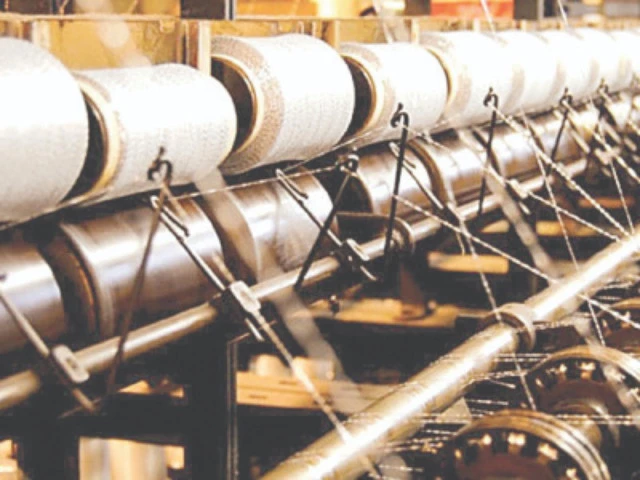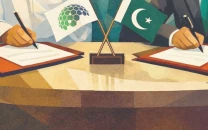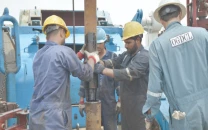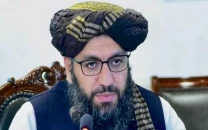Govt urged to restore EFS in original form
Row between yarn, fabric producers and apparel sector deepens

Pakistan Hosiery Manufacturers Association Chairman Babar Khan has emphasised that the Export Facilitation Scheme (EFS) should be restored in its true spirit and local supplies should also be included in its scope as the scheme has contributed to boosting exports not only in the value-added sector but also across several non-traditional areas.
Speaking at a press conference in Karachi on Wednesday, he noted that the process of depositing sales tax and receiving refunds was taking five to six months, which created liquidity issues. He was of the view that the spinners' lobby was demanding duties on yarn and fabric to maintain its monopoly and was misleading the government. "We make up to 70% value addition in imported cotton; therefore, we demand a long-term policy," Babar Khan said, adding that there was constant anxiety before every budget over possible policy changes.
Karachi Chamber of Commerce and Industry (KCCI) President Jawed Bilwani claimed that the All Pakistan Textile Mills Association (Aptma) chairman had acknowledged during a Planning Commission meeting that the quality of their yarn was substandard. He emphasised that imported cotton was both cheaper and of better quality, which enabled exports of non-traditional products. The EFS supported exports after the downturn caused by Covid-19 and should continue as originally envisioned, he said and mentioned that all textile composite units were supporting their stance.
In response to a question, Bilwani stated that the value-added sector had not misused the EFS and a real-time audit could be conducted, alleging that the misuse occurred in the iron and steel sector. He stressed that the scheme had opened up new export opportunities.
Bilwani questioned how exports were increasing when hundreds of spinning units had shut down. He proposed that the government should give sales tax exemption on local cotton and yarn sales as well.
Furthermore, he urged that utility tariffs for the spinning and export industries be aligned with those in the regional competitor countries. He recommended introducing a final tax regime instead of a normal one for export sectors and abolishing the advance tax collection.
Meanwhile, at a joint press conference held at the PHMA Lahore office, the hosiery manufacturers and the Pakistan Readymade Garments Manufacturers and Exporters Association (PRGMEA) demanded urgent action to restore the EFS in its original spirit. The request comes after local yarn and fabric producers demanded the withdrawal of the scheme, citing its misuse.
The leadership jointly called on Prime Minister Shehbaz Sharif to intervene and halt policy shifts that were threatening to dismantle the EFS. They warned that the ongoing bureaucratic distortions, compounded by lobbying from the spinning sector for new tariffs, were pushing the small and medium enterprise (SME)-based apparel export industry towards serious crisis.
PHMA Zonal Chairman Abdul Hameed and PRGMEA Regional Chairman Dr Ayyazuddin said the EFS had been introduced to allow duty-free import of raw material for exporters, giving Pakistan's apparel sector a competitive edge.
"Instead of simplifying exports, the EFS has become bogged down by manual procedures and is now under threat from proposed tariff changes," said Abdul Hameed.
Ayyazuddin stressed that the SMEs, which formed the bulk of the value-added industry, could not survive under such conditions. "We operate on thin margins and short timelines. The EFS was a breakthrough for us, but now it's being reshaped to serve upstream interests. These tariffs, reportedly pushed by the spinners' lobby, protect a narrow segment at the cost of Pakistan's largest job-creating export base."
The industry leaders expressed concern over reports of potential imposition of duties on raw material like synthetic yarn, man-made fibre, technical fabric and accessories – none produced locally. "Any tariff on items under HS Chapters 54, 55 and 96 is unacceptable," said Hameed. "These are essential production inputs and taxing them means taxing exports at the very beginning." Speaking virtually, former PRGMEA chairman Ijaz Khokhar said the entire value chain had welcomed the EFS as a much-needed correction in policy. "But distortions are creeping in. The original vision of a seamless, transparent system is being hijacked," he said.






















COMMENTS
Comments are moderated and generally will be posted if they are on-topic and not abusive.
For more information, please see our Comments FAQ